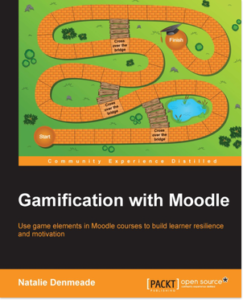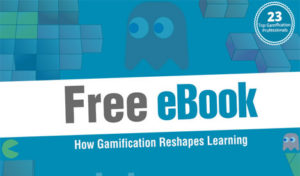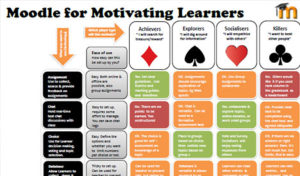 Natalie Casandra Denmeade, (2017) “The hero’s learning journey”, World Journal of Science, Technology and Sustainable Development, Vol. 14 Issue: 2/3, pp.155-171, https://doi.org/10.1108/WJSTSD-06-2016-0042
Natalie Casandra Denmeade, (2017) “The hero’s learning journey”, World Journal of Science, Technology and Sustainable Development, Vol. 14 Issue: 2/3, pp.155-171, https://doi.org/10.1108/WJSTSD-06-2016-0042
Download link
Purpose
The purpose of this paper is to discuss how educators can harness the natural momentum of learning to create a dramatic and exciting hero’s learning journey. Given the importance of motivation, educators can borrow ideas from game designers by using gamification – a process to re-frame a real life goal to be more appealing and achievable. A series of learning activities, developed to meet both cognitive and emotional needs, results in an engaging learning journey.
Design/methodology/approach
The concept presented, based on PSI Theory, OCEAN Big Five character traits and player/learner archetypes, is that learners are motivated by three basic needs: affiliation, competence or certainty (assuming other physiological needs are met).
Findings
Armed with insight into types of motivations at different phases, learner experience designers can create different learning journeys and user profiles. Learning activities can be planned for each need and phase based on changing motivations: collaborate and curate (affiliation), choice and ownership (certainty), challenge and accountability (competence).
Read more and view diagrams and images
2016: Official Report to the Premier of NSW Teacher Scholarship Committee
This report is about Natalie Denmeade’s 2016 Study Tour to South and East Africa – This work was produced with funding from a NSW Premier Scholarship. It includes six case-studies of Gamification in Education. The recommendations are that TAFE NSW export their excellent World Wide English resources to meet demands in East Africa, and that Australian Indigenous Education can benefit from the resources and approached used by African Entrepreneurs.
2015: Gamification with Moodle

Use game elements in Moodle courses to build learner resilience and motivation. Download eBook or Hard Copy from Amazon. Chapter previews are available on the Packt Publishing website. This book has been designed for teachers who to use technology to create more engaging learning experiences for both online learning and in face-to-face sessions. This book will especially appeal to people who are interested in the underlying mechanics of play and games and want to know more about applying these concepts in an educational context.
What You Will Learn
- Set up a scoring system using Moodle Gradebook
- Enable communication and collaboration in your class as a Learning Community using forums
- Assess your learners’ abilities by setting up challenges and quests
- Configure gateways to check and ensure progress before new content or activities are released
- Create Moodle assignments to provide effective feedback through a comment bank and custom scale
- Issue Open Badges to recognize achievements and set up an online backpack to share digital badges
- Reduce anxiety for learners by using the game-like concept of “Leveling Up”
Download link
2015: Why some Teachers are reluctant to use Moodle LMS
In large institutes where Moodle is optional for teaching staff you will find evangelist Moodlers who enthusiastically
share how Moodle improves the efficiency and quality of their teaching. However, not all staff are so eager to ‘learn
another new thing’. We asked why and found most obstacles were in organisational culture (32%) and individual
perceptions (23%) followed by individual skill and concerns over copyright and IP.
2014: How Gamification Reshapes Learning

The chapter by Natalie Denmeade is on Page 17. ‘The Most Effective Uses of Gamification in Learning! In this Free ebook you will find useful information about Gamification, its applications, and impact on the reshaping of learning, provided by 23 Gamification professionals. They were all carefully selected based on their specialized knowledge on Gamification, education and business, as well as their innovative projects in this field. They share their wisdom and provide tips on the effective use of Gamification in the learning process. ‘
2013: Moodle for Motivating Learners Tool Guide

The Moodle for Motivating Learners Tool guide shows how Moodle (or other LMS) activities are matched to Bartle’s Player Types: Achievers, Socialisers, Explorers and Killers. It provides a simple at-a-glance reference for starting to use gamified techniques in your course development. Although we play multiple roles and change the roles we play over time, understanding these stereotypes can provide insight into the wide range of motivations behind participants’ actions.
